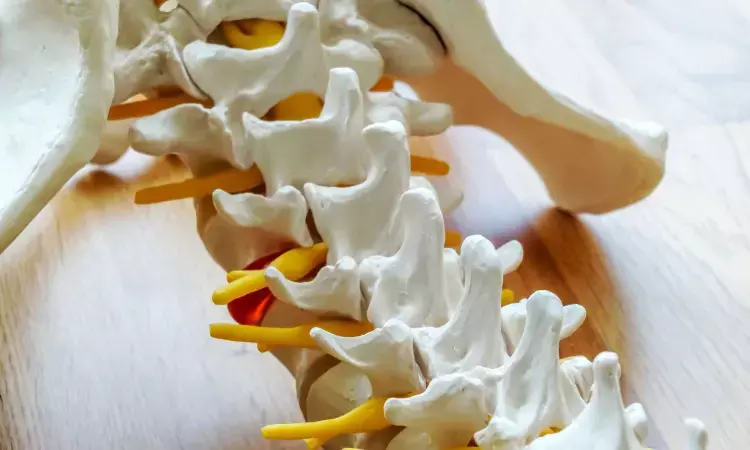- Home
- Medical news & Guidelines
- Anesthesiology
- Cardiology and CTVS
- Critical Care
- Dentistry
- Dermatology
- Diabetes and Endocrinology
- ENT
- Gastroenterology
- Medicine
- Nephrology
- Neurology
- Obstretics-Gynaecology
- Oncology
- Ophthalmology
- Orthopaedics
- Pediatrics-Neonatology
- Psychiatry
- Pulmonology
- Radiology
- Surgery
- Urology
- Laboratory Medicine
- Diet
- Nursing
- Paramedical
- Physiotherapy
- Health news
- Fact Check
- Bone Health Fact Check
- Brain Health Fact Check
- Cancer Related Fact Check
- Child Care Fact Check
- Dental and oral health fact check
- Diabetes and metabolic health fact check
- Diet and Nutrition Fact Check
- Eye and ENT Care Fact Check
- Fitness fact check
- Gut health fact check
- Heart health fact check
- Kidney health fact check
- Medical education fact check
- Men's health fact check
- Respiratory fact check
- Skin and hair care fact check
- Vaccine and Immunization fact check
- Women's health fact check
- AYUSH
- State News
- Andaman and Nicobar Islands
- Andhra Pradesh
- Arunachal Pradesh
- Assam
- Bihar
- Chandigarh
- Chattisgarh
- Dadra and Nagar Haveli
- Daman and Diu
- Delhi
- Goa
- Gujarat
- Haryana
- Himachal Pradesh
- Jammu & Kashmir
- Jharkhand
- Karnataka
- Kerala
- Ladakh
- Lakshadweep
- Madhya Pradesh
- Maharashtra
- Manipur
- Meghalaya
- Mizoram
- Nagaland
- Odisha
- Puducherry
- Punjab
- Rajasthan
- Sikkim
- Tamil Nadu
- Telangana
- Tripura
- Uttar Pradesh
- Uttrakhand
- West Bengal
- Medical Education
- Industry
Spinal cord injury can trigger neurogenic immune deficiency syndrome revealed by decrease in mHLA-DR expression

A recent study by Marcel Kopp and team has shed light on the immune suppression that follows spinal cord injury (SCI). The findings published in Brain Journal reveals that SCI patients are more susceptible to infections, which are the leading cause of death and hinder rehabilitation progress.
The multicenter cohort study, involving 111 patients, aimed to distinguish between neurogenic effects specific to SCI and general trauma-related impacts on the immune system. To achieve this, patient groups with different neurological levels and severity of SCI were compared with a reference group of vertebral fracture (VF) patients without SCI.
The primary outcome of the study was the quantitative expression of monocytic Human Leukocyte Antigen-DR (mHLA-DR), a validated marker indicating immune suppression in critically ill patients and associated with susceptibility to infections. Using standardized flow cytometry procedures, mHLA-DR levels were measured from the first day up to 10 weeks after injury. Secondary outcomes included counts of leucocyte subpopulations, serum immunoglobulin levels, and clinically defined infections.
The results showed that all SCI patient groups had immune suppressive states with quantitative mHLA-DR levels falling below the normative values of 9.62. Notably, the extent of immune suppression varied depending on the neurological level of injury. Patients with high SCI (at or above thoracic (Th)4) exhibited mHLA-DR levels of 8.95, while those with low SCI (below Th5) had levels of 9.05. In comparison, the VF group without SCI had mHLA-DR levels of 9.25. These differences were statistically significant (P = 0.003).
Further analysis revealed that patients with complete, high SCI experienced the most pronounced decrease in mHLA-DR expression. Their recovery was delayed, and their levels remained consistently lower than those of the VF control group. These patients also exhibited lower serum immunoglobulin G and immunoglobulin A levels, indicating humoral immune deficiency, for up to 10 weeks after injury.
Moreover, the study showed a clear association between lower mHLA-DR levels, borderline immunoparalysis, and an increased risk of infections occurring earlier in the recovery process. These findings align with similar studies conducted on stroke and major surgery patients.
Reference:
Kopp, M. A., Meisel, C., Liebscher, T., Watzlawick, R., Cinelli, P., Schweizerhof, O., Blex, C., Lübstorf, T., Prilipp, E., Niedeggen, A., Druschel, C., Schaser, K.-D., Fehlings, M. G., Vajkoczy, P., Cabraja, M., … Schwab, J. M. (2023). The spinal cord injury-induced immune deficiency syndrome: results of the SCIentinel study. In Brain. Oxford University Press (OUP). https://doi.org/10.1093/brain/awad092
Neuroscience Masters graduate
Jacinthlyn Sylvia, a Neuroscience Master's graduate from Chennai has worked extensively in deciphering the neurobiology of cognition and motor control in aging. She also has spread-out exposure to Neurosurgery from her Bachelor’s. She is currently involved in active Neuro-Oncology research. She is an upcoming neuroscientist with a fiery passion for writing. Her news cover at Medical Dialogues feature recent discoveries and updates from the healthcare and biomedical research fields. She can be reached at editorial@medicaldialogues.in
Dr Kamal Kant Kohli-MBBS, DTCD- a chest specialist with more than 30 years of practice and a flair for writing clinical articles, Dr Kamal Kant Kohli joined Medical Dialogues as a Chief Editor of Medical News. Besides writing articles, as an editor, he proofreads and verifies all the medical content published on Medical Dialogues including those coming from journals, studies,medical conferences,guidelines etc. Email: drkohli@medicaldialogues.in. Contact no. 011-43720751


